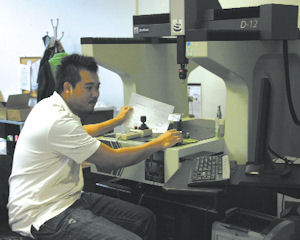Aerospace supplier W Machine Works is adding space and machining capacity to its Pacoima facility in an effort to diversify its customer base and boost output to commercial aircraft manufacturers. President Marzel Neckien is looking to keep the company on a growth trajectory, which also may include buying other aerospace assembly companies. “We are adding more capability to our product mix, while ensuring near perfect quality and delivery,” Neckien said. In February, the family-owned W Machine Works purchased a 20,000-square-foot building next door to its current location on Del Sur Street. The space was intended to house a new, $600,000 milling machine and an area to assemble aircraft components. The company had planned to expand in the spring, but heavy rains flooded the facility, delaying the move and delivery dates, officials said. “With a new spindle we could get 140 hours more of cutting time,” said J.P. Walz, vice president of marketing and sales. “That’s 140 hours worth of parts we could have sold.” Company officials say the new five-axis milling machine will be in place in the new building by December. The remaining space will be used to assemble aircraft components — a response to changes in the aerospace industry where the prime manufacturers doing the final assembly buy components rather than individual parts. Large companies increasingly are buying up smaller parts manufacturers to build up their capacity to provide full components. Companies have approached W Machine Works as an acquisition target, but the company has turned down offers to grow on its own, officials said. W Machine Works has come a long way since Wolfgang Neckien started the company in 1978 in the garage of the family’s Panorama City home. In 2003, his son, Marzel, became president of the company. That year, W Machine moved from a Panorama City building with four 2,500-square-foot manufacturing bays to its current location of about 20,000 square feet. Since 2003, W Machine Works has increased its sales every year. In 2010, the company brought in about $12 million in sales, Neckien said. This year, Neckien and Walz anticipate hitting that $12 million sales figure again. A number of factors contribute to the flat growth, the pair said, including the sluggish economy, cutbacks in government defense spending and losing a major aerospace customer to a competitor. The decision to buy a second building came out of the management team’s strategic planning session, where company leaders voiced concern that the company had maxed out the space in the existing building, Neckien said. Growth potential W Machine customers include Boeing, Northrop Grumman, BAE, ITT and Cessna. Boeing, in particular, is an important customer to the company. W Machine has supplied parts for Boeing’s 787 Dreamliner, the passenger and cargo version of the 747-8, and next generation 737s. It also has supplied parts for Boeing’s military programs, including the F-18, C-17 and the Apache attack helicopter. Color prints of Boeing aircraft line the walls at W Machine’s office. The growth area for Boeing suppliers is in the 737 and 787 aircraft, said Scott Hamilton, managing director at aerospace industry consultant firm Leeham Co. LLC. The 737 is the program to be on as Boeing plans to ramp up production of the aircraft between now and 2013, Hamilton said. “Boeing is considering going to 50-60 a month, and with the launch of the 737 MAX re-engine, there is a long life and a stable line for those suppliers working on the 737,” Hamilton said. Now that the Federal Aviation Administration has certified the 787, that aircraft will be a solid program for suppliers as Boeing increases production from the two aircraft being made per month, Hamilton said. The Dreamliner has been a strain on suppliers, which have paid manufacturing costs out of their own pockets, Hamilton said. “The contracts typically provided that payment would not be made until certification, which only happened last month,” Hamilton said. “For many small suppliers, and for some big ones, this has meant financial disaster.” The delay certifying the Dreamliner resulted in delayed or cancelled orders for W Machine Works, which had started making parts for the aircraft, Neckien said. “In some case we were reimbursed for cancellation charges,” Neckien said. Supplying to Boeing or one of its contractors remains “vital” to the company’s existence, Walz said. “Our current workload shows that while military budgets shrink, our volume with the commercial side of the business continues to expand,” he said.
